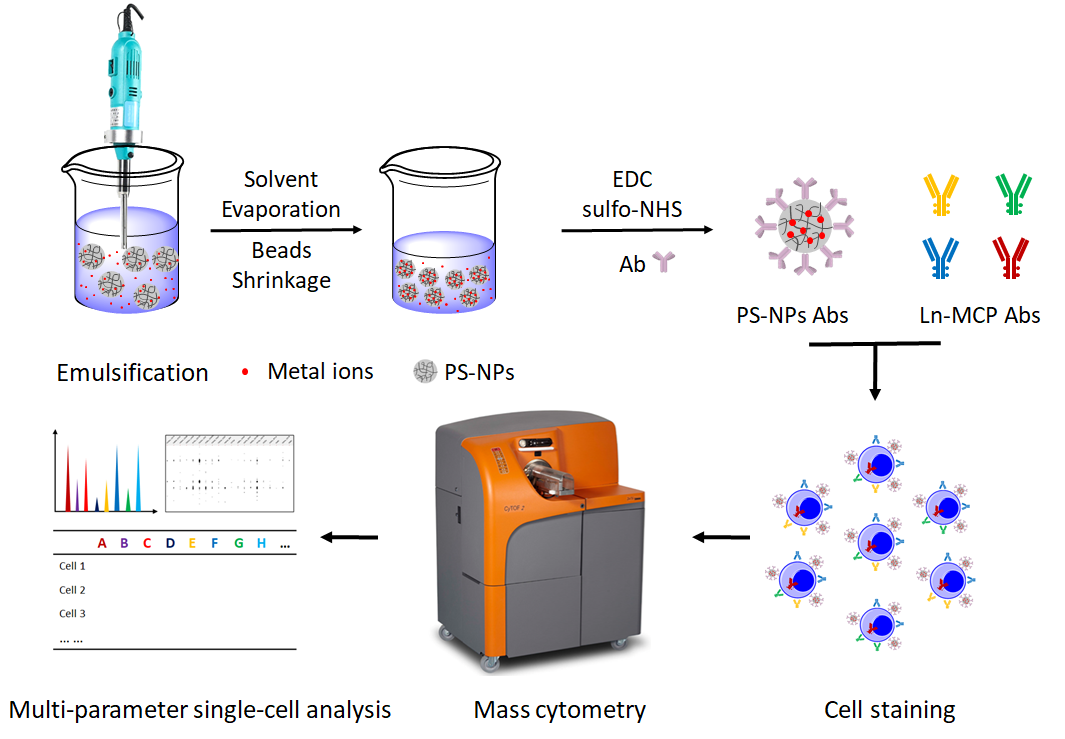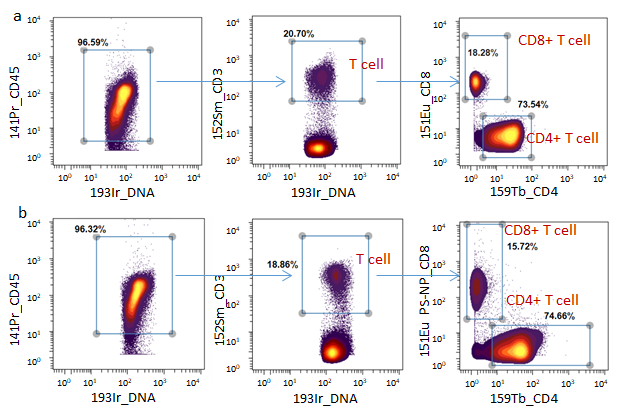Researchers with the Suzhou Institute of Biomedical Engineering and Technology (SIBET) of the Chinese Academy of Sciences recently proposed a novel metal label strategy to increase mass cytometry (MC) sensitivity and expand MC detection channels.
MC is an emerging bioanalytical technique for high-dimensional biomarkers interrogation simultaneously on individual cells. By utilizing heavy metal isotopes labeled antibodies (Abs) to stain cells, MC avoids the spectral overlap and auto-fluorescence phenomenon which severely restricts the highly multiplexed capability of conventional fluorescence flow cytometry (FCM) and allows the measurement and quantification of up to 135 markers with single-cell resolution in theory.
However, over 60% of the isotope channels have not been implemented due to the lack of suitable carriers to capture metal isotopes. Thus, a novel approach to synthesize MC mass tags is still full of challenges.
This strategy, proposed by the SIBET team led by Professor BAI Pengli, is based on the using of a classical material, polystyrene nanoparticle (PS-NP) to carry metals (rare earth, Zr, Hf) and conjugate with antibodies.

Figure 1. Schematic illustration of metal doped PS-NP_Abs mass tags synthesis and MC assay. (Image by SIBET)
At present, several nanoparticle-based MC mass tags were reported to increase the sensitivity and expand MC detection channels. Nevertheless, most of them need complicated surface modifications during probe preparation in order to lower the nonspecific binding of mass tags to cells.
By using polystyrene nanoparticle as metal carriers, LIU Zhizhou and his colleagues from BAI’s group proposed a universal approach to synthesize MC mass tag.
Four new MC detection channels (177Hf, 178Hf, 179Hf and 180Hf) were introduced in to MC for the first time. When cooperated with commercial metal chelating polymer (MCP) mass tags, the metal@PS-NP_Abs mass tags can clearly distinguish different subpopulations of human mononuclear cells. The new mass tag showed a five-fold higher sensitivity than MCP mass tags.
In addition, a new nonspecific binding reduction method by exploring new cell staining buffer instead of complicated surface modification and strictly size control used in other mass tag design strategy was reported.
Moreover, these PS-NPs based mass tags showed high compatibility with commercial MCP-Abs for highly multiplexing detection of human MNCs biomarkers.

Figure 2. Dot plots of MNCs stained by a) 141Pr-MCP_CD45, 152Sm-MCP_CD3, 151Eu-MCP_CD8, 159Tb-MCP_CD4 and b) 141Pr-MCP_CD45, 152Sm-MCP_CD3, 151Eu-PS-NPs_CD8, 159Tb-MCP_CD4. (Image by SIBET)
"We believed that more kinds of PS-NPs with different metals would be prepared for MC metal tags, and dual-functionality probes for both FCM and MC can be achieved if appropriate dyes were swelling to the PS-NPs along with metal ions, which can be used in both MC and flow cytometry or imaging.” said LIU, first author of the paper for this study.
The work entitled "A Universal Mass Tag based on Polystyrene Nanoparticles for Single-Cell Multiplexing with Mass Cytometry" was published in Journal of Colloid and Interface Science 2023, 639, 434-443..
This work was supported by the Ministry of Science and Technology of the People's Republic of China (Grant No. 2022YFF0710200), Natural Science Foundation of Jiangsu Province, China (Grant No. BK20210105), Chinese Academy of sciences Program (ZDKYYQ20180003) and the Youth Innovation Promotion Association, the Chinese Academy of Sciences (Grant No. 2019321).
Contact
XIAO Xintong
Suzhou Institute of Biomedical Engineering and Technology, Chinese Academy of Sciences (http://www.sibet.cas.cn/)
Phone: 86-512-69588013
E-mail: xiaoxt@sibet.ac.cn